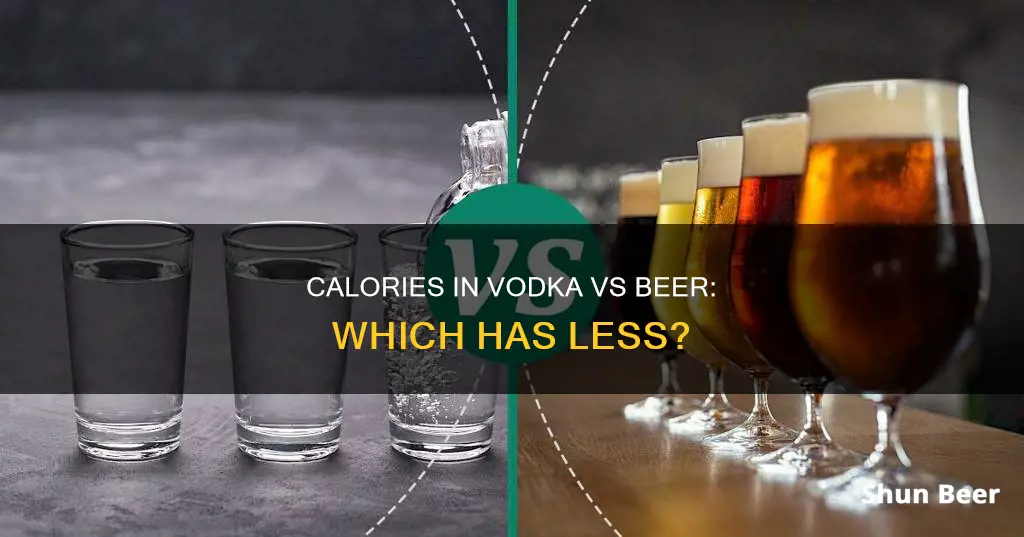
Vodka and beer are two of the most popular alcoholic drinks worldwide, but which is lower in calories? Vodka is often considered a good choice for those watching their weight as it's one of the lowest-calorie alcoholic drinks available, containing very few calories and zero carbs. It's also gluten-free. A single shot of vodka typically has less than 100 calories. Beer, on the other hand, is a little more complicated when it comes to nutritional information as the calorie content varies depending on the type of beer. However, as a general rule, darker beers tend to be heavier and contain more calories than lighter-coloured beers. So, if you're looking for a lower-calorie option, vodka is usually the better choice.
| Characteristics | Values |
|---|---|
| Calories | Vodka has fewer calories than beer, but the number of calories depends on the proof of the vodka and the type of beer. |
| ABV | Vodka has a higher ABV than beer. |
| Nutritional value | Vodka has no nutritional value, whereas beer contains carbohydrates, sugars and calories. |
| Production process | Vodka is distilled beer, which is why it has fewer calories. |
What You'll Learn

Vodka is gluten-free and has zero carbs
Vodka is a popular choice for those watching their weight or restricting their carb intake. This is because vodka is a low-calorie alcohol with zero carbs, sugar, or fat. It is also gluten-free.
Vodka is made from ethanol and water, which means it has no nutritional value. It is typically distilled from gluten-based grains like wheat, barley, or rye, but the distillation process removes the gluten. Even people with celiac disease can safely consume pure, distilled vodka. However, some flavoured vodkas may contain hidden gluten in the form of added ingredients after distillation, so it is important to read labels carefully.
Some people still experience gluten-related symptoms after drinking vodka made from gluten grains. This could be due to gluten cross-contamination or a reaction to tiny fragments of the gluten protein that may remain in the vodka even after distillation. If you experience gluten sensitivity, it is best to choose vodkas distilled from gluten-free substances like potatoes, corn, grapes, or even figs. These vodkas are becoming increasingly popular and are said to be "smoother" and less likely to cause a hangover.
When it comes to calories, vodka is one of the lowest-calorie alcoholic beverages. A single shot of vodka typically has less than 100 calories, depending on its proof. The higher the proof, the more calories it contains. For example, a 1.5-ounce shot of 80-proof vodka has approximately 96 calories. In comparison, a 12-ounce light beer has under 100 calories, while a regular or specialty beer can have significantly more calories.
So, if you are watching your weight or restricting your carb intake, vodka is a better choice than beer. However, it is important to remember that excessive alcohol consumption can lead to adverse health effects, and it is always best to drink in moderation.
Calorie Counting Mad Elf Beer: Nutritional Facts
You may want to see also

Vodka has fewer calories than beer
Vodka is a good choice if you're watching your weight but still want to enjoy a drink. It's one of the lowest-calorie alcoholic drinks out there and is especially great for those on low-carb diets. Vodka is made from ethanol and water, so it has pretty much no nutritional value. It contains nothing other than ethanol and water, so there are no sugar, carbs, fibre, fat, cholesterol, vitamins or minerals in vodka. All the calories come from the alcohol itself.
A single shot of vodka typically has less than 100 calories. The exact number of calories depends on the proof of the vodka (the percentage of alcohol in the drink). The higher the proof, the more calories it contains. For example, a 1.5-ounce shot of 70-proof vodka has 85 calories, while a 100-proof vodka has 124 calories.
Beer, on the other hand, tends to be higher in calories. A pint of 5.2% ABV beer has 220 calories, and a pint of 7.5% cider has 261 calories. Even a light beer will have around 100 calories. The darker the beer, the more calories it's likely to have.
If you're watching your weight, it's best to treat vodka like a treat and stick to sensible drinking limits. Alcohol interferes with the body's fat-burning process, so it's not a good idea to overdo it. But if you're looking for a low-calorie alcoholic drink, vodka is a better choice than beer.
Calorie Count in Furphy Beer: Everything You Need to Know
You may want to see also

Vodka is made from ethanol and water
Vodka is a distilled alcoholic beverage that is primarily composed of water and ethanol. While vodka is traditionally made by distilling liquid from fermented cereal grains and potatoes, some modern brands may use other bases such as corn, sugar cane, fruits, honey, and maple sap. The distillation process involves boiling the fermented liquid and collecting the ethanol, which has a higher boiling point than water. The ethanol is then diluted with water to achieve the desired alcohol content, typically around 40% ABV for standard vodkas.
The production of vodka involves several steps, starting with the preparation of the base product. In the case of using grains or potatoes, the raw materials are milled or emulsified in water to create a mash. The mash is then heated to break down the starches and allow water to saturate them, resulting in a gelatin-like consistency. Enzymes are added to separate the glucose molecules from the starch. After straining to remove solids, yeast is added to the wash, which ferments the sugar and creates alcohol.
The fermented wash is then distilled to separate and collect the ethanol. During distillation, the undesirable compounds in the wash, such as methanol and other impurities, are removed by allowing them to remain in vapor form while the ethanol is condensed back into liquid form. The collected ethanol, also known as the "hearts," is then diluted with water to achieve the desired alcohol content. This process of creating a hydrate of water and ethanol is called proofing and can have a significant impact on the flavor and smoothness of the vodka.
While vodka is mainly composed of ethanol and water, there can be subtle variations in flavor depending on the base product used and the distillation process. Some vodkas may retain traces of impurities that impart subtle taste differences, with hints of the starches or sugar-rich plants from which the drink is fermented. The quality of the water used for dilution can also affect the flavor, with different mineral contents contributing to subtle variations. Additionally, filtration methods can play a role in removing or adding ingredients that influence the final taste of the vodka.
Overall, vodka is a popular spirit known for its clear, colorless appearance and neutral flavor profile. The distillation and dilution process ensures that the ethanol content meets the required standards, while the base product and water quality contribute to the subtle flavor variations among different brands of vodka.
Calories in Castle Free Beer: A Healthy Choice?
You may want to see also

Beer nutritional info varies
Beer is made from grains, which can be healthy, but it is not considered a health drink. Beer is a source of carbohydrates, with dark beers tending to have more carbs than light beers. A 12-oz can of ale, lager, porter, premium beer, or stout has more than 12 grams of carbohydrates, while a light beer typically has less than 1 gram.
Beer also contains minimal protein, with light beers providing about 0.7g and regular or dark beers providing about 1.6g. Beer is also an excellent source of vitamins and minerals, including folate, niacin, magnesium, and potassium. However, the calories from alcohol do not provide adequate nutrition for the body.
The calorie content of beer varies depending on the type and brand. Light beers typically have fewer than 100 calories, while regular and specialty beers can range from 95 to over 200 calories per 12-ounce serving. For example, a 12-ounce Miller Lite beer contains 96 calories, while a 12-ounce Blue Moon contains 168 calories.
Additionally, many companies do not provide nutritional information on beer cans or bottles, making it challenging to track beer calories. However, this information can usually be found on the beer maker's website or a nutrition data site.
While beer can be part of a healthy diet when consumed in moderation, excessive drinking can lead to various health risks, including injuries, certain cancers, and liver disease. Therefore, it is recommended to limit consumption to no more than two drinks per day for men and no more than one drink per day for women.
Calories in Homebrew Beer: What's the Count?
You may want to see also

Vodka is a good choice for dieters
Vodka: A Good Choice for Dieters
If you're watching your weight, vodka is a good alcoholic beverage of choice. It's one of the lowest-calorie options and is especially great for those on a low-carb diet. Vodka is made from ethanol and water, so it has no nutritional value, no sugar, no carbohydrates, no fat, and no cholesterol.
Calorie Content
The calorie content of vodka depends on its proof, which refers to the percentage of alcohol in the drink. The higher the proof, the more calories it contains. For example, a 1.5-ounce shot of 70-proof vodka has 85 calories, while a 100-proof shot has 124 calories.
Comparison to Beer
Beer, on the other hand, tends to be higher in calories. A pint of 5.2% ABV beer has 220 calories, while a 12-ounce light beer has around 100 calories. Darker beers are usually heavier and contain more calories, although this is not always the case.
Mixing with Vodka
When mixing vodka with other drinks, opt for soda water, club soda, or a diet soda with a squeeze of lemon or lime to keep the calorie and carb count low. Avoid sugary juices or sodas, as these can add extra calories and sabotage your diet.
Health Considerations
While vodka may be a relatively lower-calorie option, it's important to remember that alcohol can interfere with your body's fat-burning process. Additionally, excessive alcohol consumption can be damaging to your overall health and increase your risk of certain cancers. Therefore, it's crucial to drink in moderation and not exceed recommended intake levels.
Calorie Count of Sam '76 Beer: Is It Worth It?
You may want to see also
Frequently asked questions
Yes, vodka is lower in calories than beer. Vodka contains very few calories and zero carbs, and is considered a lower-calorie option compared to wine or beer. A single shot of vodka typically has less than 100 calories.
Other low-calorie alcoholic drinks include light beer, gin and club soda, and champagne.
To reduce the number of calories in your drink, opt for low-proof alcohol, avoid sugary mixers and soft drinks, and choose diet soft drinks instead.
Yes, it's important to drink in moderation as alcohol can disrupt sleep, cloud judgement, interact with medication, and increase the risk of certain cancers. Alcohol can also contribute to weight gain and obesity due to its high calorie and sugar content.







